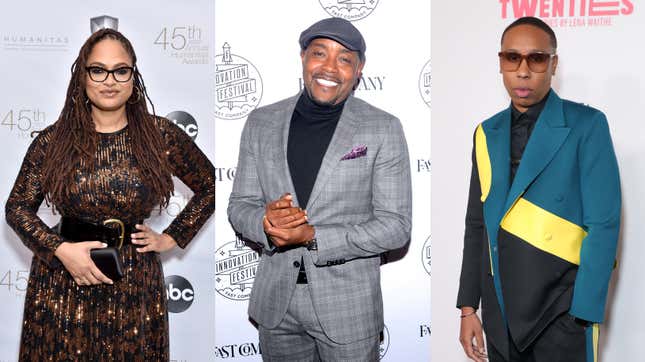
Being black in entertainment means knowing what it’s like to be the only black person in the room, taking on the responsibility of being a role model to aspiring black creators, pushing the envelope on substantial representation, and much, much more.
Today, as we watch a sort of “reckoning” happening in the industry, we must now ask: what is it like to be black in Hollywood now? Thankfully, to shed light on those experiences, nearly over a dozen insiders in Black Hollywood (including actors, filmmakers, executives, lawyers and more) recently spoke with the LA Times on a variety of related topics such as performative activism, their experiences working amongst white gatekeepers and the burden of representation.
Unfortunately, it did take the countless police killings of black people amid a pandemic to get to this much-needed conversation to take place, but alas, here we are. One particular thing black folks have discussed is the current influx of well-meaning white folks reaching out to support. Naturally, Hollywood insiders aren’t exempt from this.
“You have certain people who are really reaching in, in a way that’s active and progressive, and you have folks that are going through the motions,” Ava DuVernay said. “And in this moment, there are no more motions. That kind of empty exercise is being duly noted by me and others.”
“I, like many people in the business, have been contacted by my white colleagues and peers, reaching out to say, “Where do we go from here?” I welcome that,” Will Packer noted. “We’ve been here and felt this before. For many of us, it’s a generational anger and a generational exhaustion. But at the same time, there is something different this time. I didn’t get this volume of calls around Trayvon Martin, Michael Brown or Eric Garner.”
Though the reach-outs have been acknowledged, we can’t forget that this isn’t just about a moment, but the everyday lives of black people navigating their careers.
“I went to my first Vanity Fair Oscar party, and after going through five checkpoints I walked in and finally got to the door, and I was told the chauffeurs are around the corner,” Darrell D. Miller, lawyer and entertainment department chair of Fox Rothschild recalled. “I’ve come to Hollywood and I’m at the top of my game. But I haven’t escaped the external reality.”
“In our workplace, we’ve got to be nice to people, we’ve got to have dinner with them and sit next to them at premieres, you know what I’m saying? It is a truly traumatic thing for a lot of black artists because you’re constantly having to rub shoulders with your oppressors,” Lena Waithe said.
Unfortunately, this kind of marginalization doesn’t necessarily decrease on the way to the top.
“I do think that people, especially white people in positions of power, need to get comfortable with being uncomfortable; it is monumentally important to the change we need to make,” Jermaine Johnson, manager at 3 Arts Entertainment said. “At the top, so long as equality feels like oppression, then we need a reality check for ourselves.”
“There are lots of people asking me what I think they should do. My response is the same: You, as white people, should speak to each other,” Nina Shaw, founding partner of Del Shaw Moonves Tanaka Finkelstein & Lezcano said. “I want you to take ownership, I don’t want you to ask me what you should do. It’s always the same: Treat it like it really mattered to you. Every bonus now should be based on how diversity has been achieved.”
Overall, there may be a lot to unpack and work through but one fact is simple—we’re way past performances. Empty gestures aren’t going to fly.
“What I’ve found is the folks on the ground doing the work are not getting the influx of money from studios, networks and agencies, because those checks are going to the [high profile, legacy social justice organizations] you know. That tells me it’s performative. Performance doesn’t fix systems and structures. I don’t think it’s coming from a place of malice, it’s coming from a place of ignorance. People just don’t know what to do,” DuVernay concluded.
Listening to black people speak on their experiences and fully digesting these anecdotes is certainly a good start. I’m absolutely glad black people in entertainment are getting a platform to speak the truth and—hopefully—aren’t penalized for it. I know one thing via social media alone: if we even get a whiff of any type of blacklisting occurring, we will hold those responsible accountable. We are staying on their necks. We won’t let this just go away. This is an ongoing effort that will take intentional work to create effective change.
Now that Black Hollywood representatives have had their chance to speak their truth, I look forward to their white counterparts showing how they’re going to do the work—and actually follow through on it.



